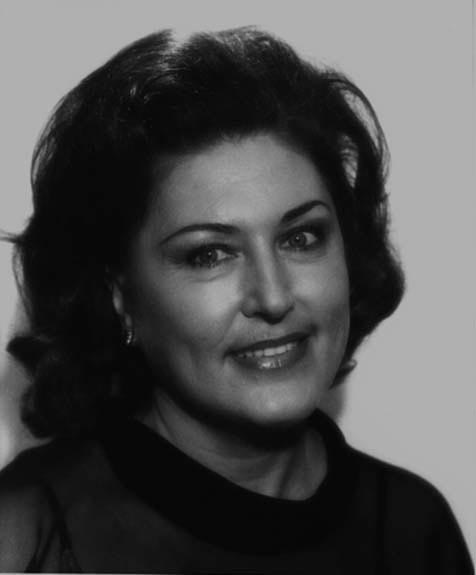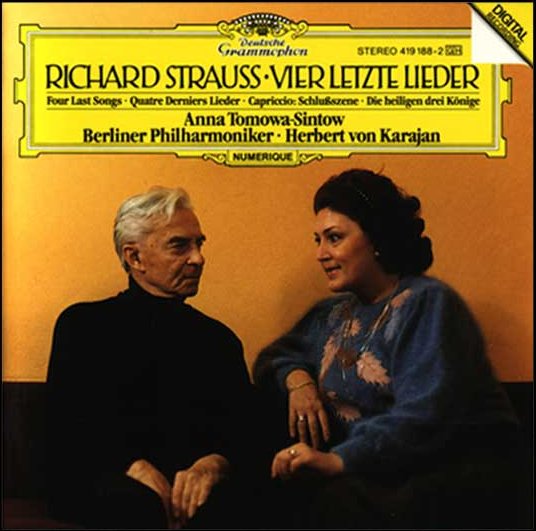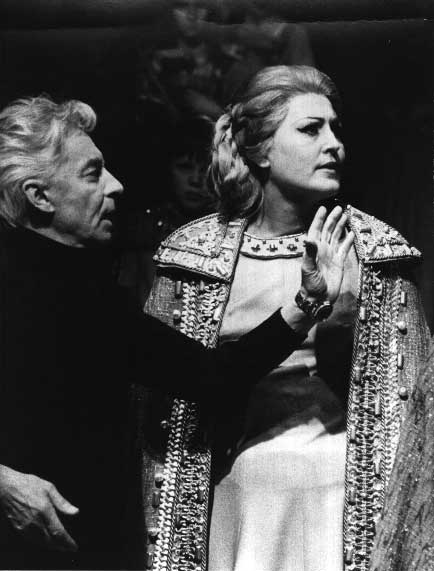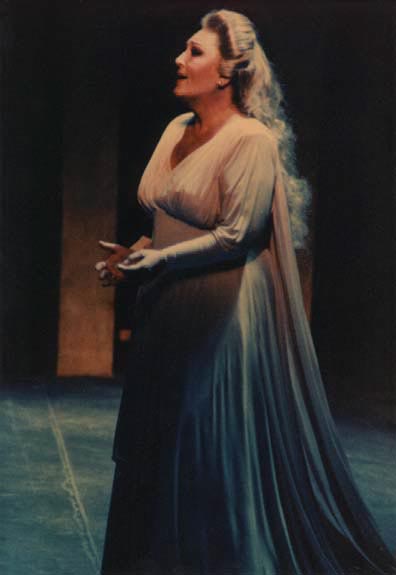Soprano Anna Tomowa-Sintow
A Conversation with Bruce Duffie

This conversation was held in Chicago in October of 1985 and first
published in Wagner News two
years later. I am pleased to be able to share it again now, in
2008, on my website. Much more information and many more
photographs are currently available on her website. What
follows is the text which was given to the Wagner Society of America
for their magazine 21 years ago. The photos have been added for
this internet presentation.
=== === ===
=== ===
Anna Tomowa-Sintow is one of the select few artists who sings
regularly with Herbert von Karajan. She has given performances
with him of operas by Mozart, Strauss, and Wagner. Other
composers figure into her career, especially Giuseppe Verdi, and
Chicago has enjoyed her both as the title character in Aïda, and as Leonora in Il Travatore which she sang to open
the 1987-88 season. In 1985, she sang another title role,
Puccini’s Madama Butterfly in the Hal Prince production which was taped
for PBS TV. Between performances of that tragic heroine, it was
my pleasure to speak with Miss Tomowa-Sintow at her apartment.
She spoke some English, but Ursula Eggers, a top administrator with
Lyric Opera, was also there to provide a translation. It was
quite an interesting afternoon, and here is much of what said…..
Bruce Duffie: Tell me the
secret of singing Mozart!
Anna Tomowa-Sintow: There
is no secret, just a love for Mozart, and he is very well suited to the
voice. It took a little while before I started with Mozart.
In Bavaria I studied at school, and I was engaged in Germany almost
immediately after the conservatory. It took a little while before
I started Mozart. Four years after the start of my career in
Germany, Donna Anna was offered. Then came the Countess and
Fiordiligi. I was very proud to sing Mozart with Maestro Karajan
in his home-town of Salzburg, and also Donna Anna with Karl Böhm,
both
of whom/which were instrumental in introducing me to Mozart in the
proper way.
BD: What is the proper
way to sing Mozart?
AT-S: You have to have
the inner affinity and flexibility to interpret the music. The
vocal chords in the voice have to have the flexibility for the
instrumental singing. It helped a lot that I was a pianist and
had played Mozart. I was very familiar and liked the style.
But thanks to Karajan and Böhm, I got the courage to sing Mozart
not
like an instrument, but with a human voice. While Mozart,
obviously, represents so many inner feelings and has so many nuances,
it is very good to present the instrumental side of the singing.
But there has to be a human soul and that has to come out in your own
interpretation not only through clear singing, but there has to be a
personality and the soul.
BD: Did Mozart understand
the human voice better than any other composer?
AT-S: It is known that
Mozart is the best medicine for the voice. I am quite sure that
he knew what he was composing, but it is clear that it was very
intuitive.
BD: Is this what we’re
losing today – composers who understand the workings of the human voice?
 AT-S: You should start and get
to know what a voice can do, but you should also know what is fun to
sing so it can come out. Even if it’s a tragedy, it should be a
pleasant experience to sing it. The style ends with Richard
Strauss and after that comes the “modern” music. You can’t forget
that Strauss’ favorite composer was Mozart and his favorite opera to
conduct was Così.
It’s something special if a composer can awaken feelings within you
that you can bring out through your own interpretation. That, I
think, is what Mozart did to Strauss in his composing. He gave
you the ideas. The general consensus is that you have to scream
and shout when you sing Wagner, and that was not really the idea of
Wagner. That’s why he built the pit in Bayreuth, which is
entirely covered. Eva and Elisabeth are sung with instrumental
lines. If you sing loud, it’s the interpretation of what comes
out of your human feelings for the part. It’s the length of the
operas of Wagner that calls for the stamina, but within the operas
there is so much lyric music and caressing music.
AT-S: You should start and get
to know what a voice can do, but you should also know what is fun to
sing so it can come out. Even if it’s a tragedy, it should be a
pleasant experience to sing it. The style ends with Richard
Strauss and after that comes the “modern” music. You can’t forget
that Strauss’ favorite composer was Mozart and his favorite opera to
conduct was Così.
It’s something special if a composer can awaken feelings within you
that you can bring out through your own interpretation. That, I
think, is what Mozart did to Strauss in his composing. He gave
you the ideas. The general consensus is that you have to scream
and shout when you sing Wagner, and that was not really the idea of
Wagner. That’s why he built the pit in Bayreuth, which is
entirely covered. Eva and Elisabeth are sung with instrumental
lines. If you sing loud, it’s the interpretation of what comes
out of your human feelings for the part. It’s the length of the
operas of Wagner that calls for the stamina, but within the operas
there is so much lyric music and caressing music.
BD: Has Wagner been
falsely accused of being a voice-wrecker?
AT-S: Yes, falsely.
Wagner wrote some of the most beautiful music to sing, but not to
shout! There’s lots of thought behind his music and you have to
really feel it, and everyone who sings Wagner has to know that and has
to interpret it. Then it’s not dangerous to sing Wagner.
The problem is whether the singer understands Wagner or not.
BD: Wagner doesn’t treat
the voice as an instrument, does he?
AT-S: I feel that the
human voice is an instrument to interpret the music through the
individual personality. I am not on the stage to represent
Tomowa-Sintow, but to interpret the role and to bring out of it what
the composer intended to do with the role. I don’t feel that the
singing is instrumental in itself, but the whole work is a work of art
and has to be interpreted as such. An example of where the human
voice was used as an instrument would be Beethoven. Each of
Wagner’s operas is a complete circle and therefore chorus, orchestra,
and soloists are one. But I doubt if he really intended to have
the voice as an instrument. For singers who are schooled in Bel
Canto, Wagner should be no problem. Strauss maybe a little bit
more…
BD: What did Wagner learn
from the Italian School?
AT-S: Rienzi is a totally Italian
opera. Lohengrin was
not done like an Italian opera; it was not copied, but it was his own
idea. The melodies just flow like an Italian opera.
Obviously, during that time when he wrote music, Wagner was inspired by
Italian opera. It’s known that lots of Italian singers sing Lohengrin. There is early
Verdi and late Verdi and Rigoletto
has nothing to do with Otello.
The same is true in Wagner. Die
Walkuüre and Die
Meistersinger are totally different from Rienzi. My favorite Wagner
opera is Tannhaüser.
It is complete, not just from the feeling, but also in thought.
It’s very human, with a theme that would, even today, be very
up-to-date.
BD: Are Wagner operas
more unified because he was his own librettist?
AT-S: It’s a question of
taste. I like the texts very much because they were felt by him,
his own feelings. It’s his idea and his thought, and very much in
line with his music. Every syllable in every word fits the music
that it’s written for. Every sigh or thought is a pause in the
music, also. Most of the stories that Wagner wrote are full of
large symbolism, and can seem to many people to be a bit
abstract. I am very much convinced about what happens within the
operas. They interpret many secret thoughts and it’s sometimes
difficult, but, like every creator, some of his libretti are stronger
than others.
BD: Are these the secret
thoughts of Wagner, or of mankind?
AT-S: They are of
mankind. When I studied Elsa, I felt that he wrote one thing, but
when you started thinking about it, there was almost the opposite
behind it. When you look at the words, they are almost worse than
Ortrud’s. Elsa wants to be good, but when you read the words
without any understanding behind it, the character seems worse than
Ortrud. Therefore you have to interpret that onstage and be very
natural about it. Just like in life, you want to be good, but
it’s not the words that count. Therefore she says her secret
thoughts. It’s like in everyday life – you can do one thing but
your inner thought is your own and you act in a different manner.
BD: Are Elsa and Ortrud
two sides of the same coin?
AT-S: Yes. They’re
both women so they have the same kinds of ways about them. After
that, it comes to the question of individual strength and
deficiencies. In ways they are very much the same, yet they are
very different. Elsa is basically weak, so she lets herself be
infected. Wagner apparently intended Elsa to be his ideal woman,
as she should have been, not having made all the big mistakes.
But she has not been perfect, so Elsa is a typical woman.
BD: So Elsa and Lohengrin
would not have been happy even if she’d not asked the fatal question?
AT-S: I don’t think
so. He comes from a world too high for her. His standing is
too high. If she hadn’t asked the question today, she would have
on another day; if it was not that mistake, another mistake would have
been made. That’s why Elisabeth in Tannhaüser is the best
representation – a woman who can,
in the end, forgive and forget.
BD: Is there any other
link between Elsa and Elisabeth?
AT-S: Yes, the
belief. For me, Elisabeth is the stronger woman. You need a
very strong woman to bring about the contrast from Ortrud, but what
Wagner gives us in the story is Elsa’s weakness.
*
* *
* *
BD: Are the productions
of Karajan more unified because he is both producer and conductor?
 AT-S: There seems to be
something in Karajan that was also in Wagner. It would be very
difficult to get back from another person the same ideas or thoughts
when you are that high a level. That’s one side. On the
other side, his feelings for the music are so strong. He always
stands at the podium and wants to feel as a complete unit. So
most of his productions are very conventional and the personalities are
very close to what the music expresses.
AT-S: There seems to be
something in Karajan that was also in Wagner. It would be very
difficult to get back from another person the same ideas or thoughts
when you are that high a level. That’s one side. On the
other side, his feelings for the music are so strong. He always
stands at the podium and wants to feel as a complete unit. So
most of his productions are very conventional and the personalities are
very close to what the music expresses.
BD: Are the
unconventional productions of other producers a mistake?
AT-S: There are no
mistakes; it’s a question of what you understand in the unconventional
productions. Old-fashioned and boring I don’t like. In
modern productions where the producer thinks about the thoughts of the
composer it’s OK. What I don’t like is where you only notice the
producer. To interpret everything from his point of view and to
do something that nobody else has done before and to ignore anything
that the composer has intended just to make yourself more noticeable,
then I would rather have something more conventional – as long as it
follows the original thought of the work.
BD: How far can you
stretch the original thought?
AT-S: It’s a difficult
question. As an interpreter of the roles, I must agree with what
the role should be, and as long as it stands within that framework it
is OK. I don’t like it when the piece is put in a totally
different time-period. Maybe if it’s moved to the period when the
composer lived, that I could accept. But if Aïda is played with costumes
from Bohème, or when Forza is moved from the cloister to
an asylum, that I cannot accept.
BD: In some stagings of
the new Wagner productions, you see the figure of Wagner, himself, on
the stage.
AT-S: If it’s done well,
it could work. The only part that would really fit him would be
Tannhaüser.
BD: What about an
additional, silent character of Wagner manipulating the action?
AT-S: I would have to see
the whole concept, but it could complete the thought of the
production. It depends on how it is done. I believe in the
truth, and anything that merely furthers the importance and
glorification of the producer is unacceptable. Any opera can be
interpreted thousands of ways. That’s the phenomenon of great
art. The main thing is that you have the essence of the composer,
and everything else should serve that.
BD: Is Wagner great art?
AT-S: Certainly.
All of the well-known composers are, but you cannot compare one with
another. Each has his own way and is great in his own way.
BD: Are there are any
“standard” operas that are not great?
AT-S: There are
many. Not everything is absolutely great. When comparing
anything, there are greats and commons. Even from great composers
there are works that are great and some which are just average.
Some producers are very good with certain composers, the same as
singers and conductors. There are some pieces which are created
at a great moment.
*
* *
* *
BD: Do you enjoy making
recordings?
AT-S: I feel just awful
when I tape a recording. I don’t like microphones; they bother
me. But I learned from Karajan to keep apart from all the
technical aspects. Especially during the recording of Rosenkavalier, the atmosphere in
the studio was that of a regular performance. That is the most
important thing in a recording session, to create an atmosphere that
serves the work. You can’t just say, “Now we have to record this
piece and I must show off my nicest voice.” I prefer to record
only parts that I’ve already sung on the stage so I can interpret the
right feelings on the recording. The recording of Don Giovanni was a pure joy to make.
BD: Does opera belong on
TV?
AT-S: From an audience
stand-point, there is no comparison of what you would experience
onstage from what you see on television, but television is a great
thing for everyone in the world to experience something that otherwise
you might not experience. I’m a very big fan of Callas and it
would have been wonderful to have documentation of her because it would
serve other generations - and not just Callas, but also other
great singers and productions and conductors.
 BD: To enjoy or to
learn
from?
BD: To enjoy or to
learn
from?
AT-S: Both. I never
learn just to learn. It has to be enjoyed.
BD: How are the publics
different from Europe to America?
AT-S: They are all
human. There are differences from city to city, and every singer
learns to adjust to each one. I find the American public to be
fabulous. The people are open and react very spontaneously to
anything that is beautiful. I’ve noticed that in the last few
years the audiences have become more competent, and they don’t only
wait for the large effects. They need to be engaged with what
happens onstage and they expect more all the time. They want to
be captured. It’s not just enthusiasm, but they want to
experience, and anybody onstage will realize that. You get that
feedback. You’re not just blinded by what you see, you get
involved.
BD: Does the public ever
expect too much?
AT-S: No more than what
they should actually receive! The audience always expects the
right amount, but there is a large segment of the public that is
oriented towards big names. This is not bad, generally, because
the name is not a name in itself; there is a quality behind it.
It is wonderful when the public is true to being fans of that name and
supports them. I like it when the audience expects a lot.
What I don’t like is when the audience is a little skeptical.
That’s not just for America, but for all over. If the audience
expects a lot, that’s fine. But if they have a skeptical view or
have a certain preconceived idea, that’s different. That’s what I
like about the American audience – they are very open. They are
more apt to let themselves be surprised, and the reaction is very
spontaneous.
BD: How do the acoustics
of this house compare with those elsewhere in the world?
AT-S: The singers here
feel very good, but you can judge the acoustics better from the
audience part of the house. I’m not governed by the acoustics,
however. It is well-known that at La Scala there is a special
place which has the best sound and the singers fight to stand in that
spot. That’s not very interesting, though. I would rather
stand in a spot that is not well-known and still make a big
impression!
BD: It seems
that you enjoy singing.
AT-S: That is my life and
has been since I was a very little girl.
BD: Thank you for being a
singer, and I hope you will come back here soon.
AT-S: I’m
looking forward to coming back to Chicago. I like the
high professional atmosphere here. It’s a big family of artists
and a
wonderful audience.
===== =====
===== ===== =====
---- ---- ---- ---- ----
===== ===== ===== ===== =====
© 1985 Bruce Duffie
This interview was recorded on October 1,
1985. Portions were used (along with recordings) on WNIB in 1987
and 1996. This transcription was made in 1987 and published in Wagner News that December. It
was slightly re-edited and posted on this
website in September, 2008.
To see a full list (with links) of interviews which have been
transcribed and posted on this website, click here.
Award
-
winning
broadcaster Bruce Duffie was with WNIB, Classical 97 in Chicago
from 1975 until its final moment as a classical station in February of
2001. His interviews have also appeared in various magazines and
journals since 1980, and he now continues his broadcast series on WNUR-FM,
as well as on Contemporary Classical Internet Radio.
You are invited to visit his website
for more information about his work, including selected transcripts of
other interviews, plus a full list of his guests. He would also
like
to call your attention to the photos and information about his
grandfather, who was a pioneer in the automotive field more than a
century ago. You may also send him E-Mail
with comments, questions and suggestions.


 AT-S: You should start and get
to know what a voice can do, but you should also know what is fun to
sing so it can come out. Even if it’s a tragedy, it should be a
pleasant experience to sing it. The style ends with Richard
Strauss and after that comes the “modern” music. You can’t forget
that Strauss’ favorite composer was Mozart and his favorite opera to
conduct was Così.
It’s something special if a composer can awaken feelings within you
that you can bring out through your own interpretation. That, I
think, is what Mozart did to Strauss in his composing. He gave
you the ideas. The general consensus is that you have to scream
and shout when you sing Wagner, and that was not really the idea of
Wagner. That’s why he built the pit in Bayreuth, which is
entirely covered. Eva and Elisabeth are sung with instrumental
lines. If you sing loud, it’s the interpretation of what comes
out of your human feelings for the part. It’s the length of the
operas of Wagner that calls for the stamina, but within the operas
there is so much lyric music and caressing music.
AT-S: You should start and get
to know what a voice can do, but you should also know what is fun to
sing so it can come out. Even if it’s a tragedy, it should be a
pleasant experience to sing it. The style ends with Richard
Strauss and after that comes the “modern” music. You can’t forget
that Strauss’ favorite composer was Mozart and his favorite opera to
conduct was Così.
It’s something special if a composer can awaken feelings within you
that you can bring out through your own interpretation. That, I
think, is what Mozart did to Strauss in his composing. He gave
you the ideas. The general consensus is that you have to scream
and shout when you sing Wagner, and that was not really the idea of
Wagner. That’s why he built the pit in Bayreuth, which is
entirely covered. Eva and Elisabeth are sung with instrumental
lines. If you sing loud, it’s the interpretation of what comes
out of your human feelings for the part. It’s the length of the
operas of Wagner that calls for the stamina, but within the operas
there is so much lyric music and caressing music. AT-S: There seems to be
something in Karajan that was also in Wagner. It would be very
difficult to get back from another person the same ideas or thoughts
when you are that high a level. That’s one side. On the
other side, his feelings for the music are so strong. He always
stands at the podium and wants to feel as a complete unit. So
most of his productions are very conventional and the personalities are
very close to what the music expresses.
AT-S: There seems to be
something in Karajan that was also in Wagner. It would be very
difficult to get back from another person the same ideas or thoughts
when you are that high a level. That’s one side. On the
other side, his feelings for the music are so strong. He always
stands at the podium and wants to feel as a complete unit. So
most of his productions are very conventional and the personalities are
very close to what the music expresses. BD: To enjoy or to
learn
from?
BD: To enjoy or to
learn
from?